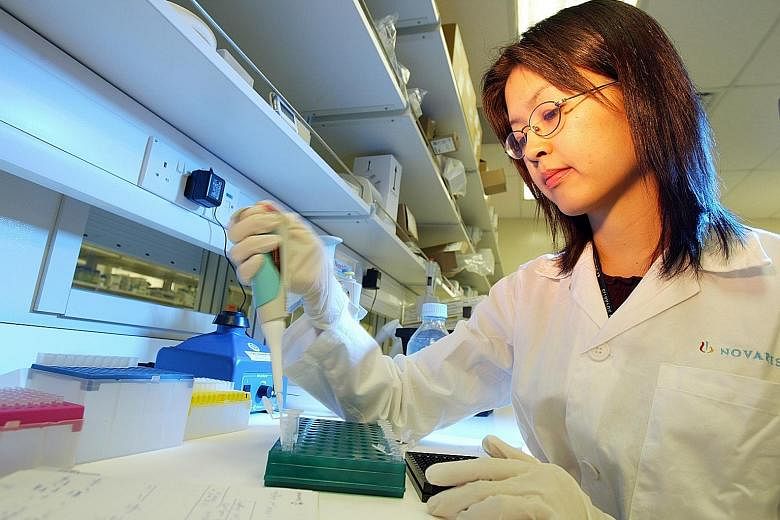Swiss pharmaceutical giant Novartis' decision to move a key research facility out of Singapore is the latest in a spate of similar closures, raising questions about the outlook for the sector here.
The moves come as big pharma companies - many of which have not delivered on new drugs in recent years - are restructuring their research-and-development operations globally, industry watchers say. This means Singapore's biomedical sciences sector must adapt to evolving trends and business models to remain relevant.
Novartis told The Straits Times earlier this week that its Novartis Institute for Tropical Diseases - located at the biomedical hub Biopolis - will be moving to Emeryville, California, next year as part of "a broader global strategic plan".
This comes after Eli Lilly closed its research-and-development unit at Biopolis in 2010, Pfizer shut its clinical research unit at Raffles Hospital in 2013, and GlaxoSmithKline closed its Biopolis facility in 2014.
These moves are "not necessarily Singapore's fault", said Mr Jason Humphries, the managing director of Good Pharma Consulting.
"Big pharma isn't what it used to be. Over the last 10 years, it's become clear that their R&D productivity has not delivered for them on new products... They're restructuring their research everywhere in the world, not just in Singapore."
-
CLOSURE OF RESEARCH FACILITIES IN SINGAPORE
Novartis
In 2017
GlaxoSmithKline
In 2014
Pfizer
In 2013
Eli Lilly
In 2010
New products are increasingly coming from small biotech firms, which tend to spring up in ecosystems with deep roots in research.
An environment conducive to such firms takes decades to build and while Singapore "has done incredible things with its investment in Biopolis", it is "pretty hard" to replicate such ecosystems within a short period, Mr Humphries noted.
Competition from other aspiring biomedical hubs around the region is also a factor.
For instance, Novartis has built a flagship R&D campus in Shanghai, China, where costs are lower and there is a huge supply of research talent from local universities which Singapore cannot match, said Mr Chua Wee Ming, a director at pharma consultancy firm HGP Asia.
"Where we lose out in numbers... we have to win the game in the area of ethics, thought leadership, quality, cost effectiveness and innovation," he added.
Mr Humphries said Singapore's focus seems to be increasingly shifting towards growing the medical devices segment, instead of trying to become a drug-development hub.
"Medical devices are simpler to develop, have a higher probability of success and commercialise much faster," he noted.
The Republic's efforts to position itself as a global biomedical hub began in earnest in the early 2000s. The sector has grown markedly since and employs about 25,000 staff across research, manufacturing and commercial activities.
Ms Ho Weng Si, the Economic Development Board's director of biomedical sciences, said R&D business models in the sector are evolving, and Singapore is open to partnering firms in different ways.
For instance, while some firms still choose to set up in-house labs to do proprietary research, others prefer joint labs with research institutes. "We have to be flexible and accommodate different models that could emerge from the industry."
The EDB is also working to grow adjacent sectors like medical technology as well as food and nutrition and personal care, noted Ms Ho.
The Government remains confident about the sector's prospects and is committed to investing resources to help it flourish, she said.


